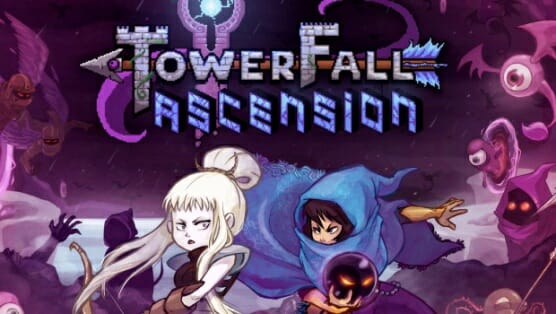
Videogames, at least the ones played with controllers, tend to be painfully complicated, and those who play them most are often terribly impatient with those who haven’t. If you don’t believe me, try watching someone who has never used dual thumbsticks play a first person shooter without commandeering their controller. The truth is that games are complicated and, if current next-gen console sales are any indication, this isn’t necessarily an asset. This is something Matt Thorson, developer of Towerfall: Ascension, seems to understand, as he has created one of the most entertaining and accessible games of the year. (And of last year, too—Towerfall originally came out on the Ouya in 2013 and made Paste’s lists of the best games and best indie games of 2013.)
In this 2D action game 2-4 players square off in a death match against one another armed only with a bow and a limited supply of arrows (typically players start with three arrows). Players aim their bows with the same thumb stick (the game is best played with a controller but can also be played with keyboard and mouse) with which they move their character. Three different buttons make your character jump, shoot or dash. If you dash right before being hit with an arrow, your character will snatch the arrow out of the air and place it in his or her quiver.
I recently had a large group of friends over to my house, none of whom would self identify as a gamer. I was astounded by how quickly they learned Towerfall’s controls and became relatively proficient. Perhaps even more telling was the fact that two of my friends who refused to play Towerfall watched with rapt attention and cheered when someone scored a particularly impressive kill.
While intentionally accessible, Towerfall is surprisingly deep. The final kill of each round is shown to all players in a brief instant replay—this allows novice players the opportunity to learn strategy and challenges more experienced players to incorporate nuances into their tactics. Games can be customized in many ways too. There are special arrows that explode on impact, drill through walls or bounce off of them, and others create thorns that will kill anyone who walks into them. You can have players start with any of these special arrows or have each round start with a randomly selected special arrow. You can have all players start with unlimited arrows or, my favorite choice, only one arrow (more arrows can be picked up in treasure chests or recovered from your opponent’s missed shots, and the amount of treasure in each level can also be adjusted.) Players can pick up shields that let them survive one hit, wings that let them fly around the level, and cloaks that make their characters invisible. These settings can be combined in many different ways to make each round unique. There is also a 1-2 player survival mode in which players fight against increasing rounds of AI-controlled enemies.
Towerfall isn’t the only local multiplayer game that strives to balance accessibility with surprisingly deep strategy. Other games like Samurai Gun, Nidhogg and Divekick have attempted a similar balance. Having played all these games, I can say that Towerfall offers more customization, more options for a single player, and a larger variety of levels. What makes Towerfall great, however, is not just that it offers more content than those other games, but rather that it manages to offer a slightly more accessible experience. To put it crudely, I just don’t find any of those games to be as fun as Towerfall, and I can’t convince as many of my friends to play them with me. I am convinced that I will keep coming back to Towerfall because of how much care Matt Thorson took in making the game easy to play with others.
Towerfall: Ascension was developed by Matt Thorson. Our review is based on the PC version. It is also available for the Playstation 4. A previous version is available for the Ouya.
Drew Dixon is the editor-in-chief of Game Church. He also edits for Christ and Pop Culture and writes about videogames for Think Christian. Follow him on Twitter.
